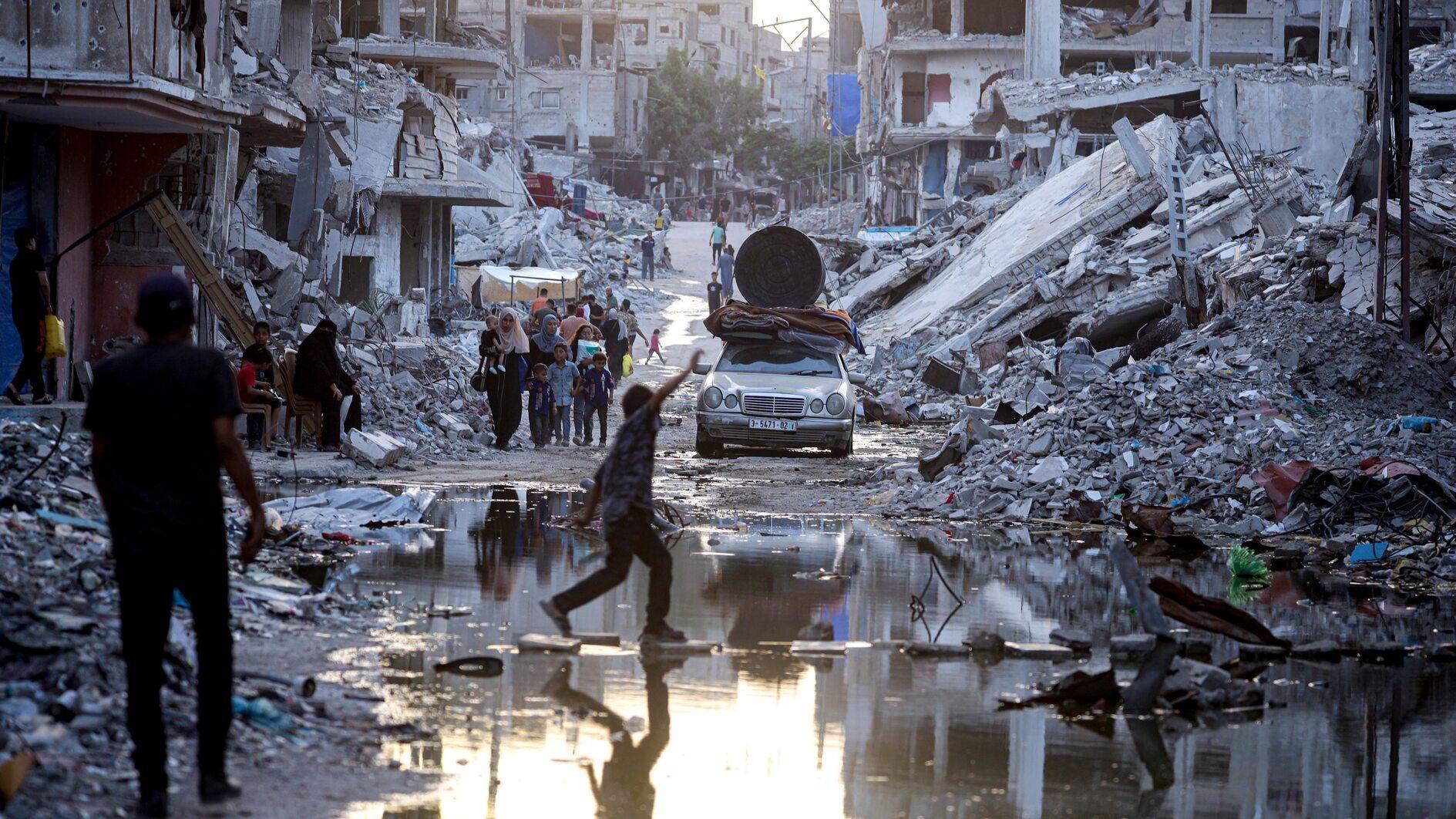GAZA STRIP

Palestinians displaced by the Israeli air and ground offensive on the Gaza Strip, walk past sewage flowing into the streets of the southern town of Khan Younis, Gaza Strip, Thursday, July 4, 2024.
The recent discovery of the first case of polio in the Gaza Strip in 25 years is presenting significant challenges for health workers and aid agencies as they prepare for a mass vaccination campaign in the conflict-torn territory.
The ongoing Israeli air strikes, restrictions on aid entering the besieged region, and the intense summer heat are all potential obstacles to the success of the critical inoculation effort.
Despite these challenges, equipment necessary for the vaccination campaign—which U.N. agencies anticipate could launch on Aug. 31—has already begun arriving in the region.
According to the Palestinian health ministry based in the occupied West Bank, a 10-month-old unvaccinated child from central Gaza tested positive for polio last week, with confirmation obtained from tests conducted in Jordan.
Gaza had not reported a polio case in 25 years, although type 2 poliovirus was detected in wastewater samples from the area in June, highlighting a significant public health threat. The poliovirus, which spreads easily through sewage and contaminated water, predominately affects children under five, potentially causing deformities, paralysis, and even death.
The World Health Organization (WHO) and UNICEF have outlined comprehensive plans to vaccinate 640,000 children across Gaza. However, conducting such a large-scale campaign amid persistent military activity poses a formidable challenge.
"It's extremely difficult to undertake a vaccination campaign of this scale and volume under a sky full of air strikes," said Juliette Touma, communications director for UNRWA, the U.N. agency for Palestinian refugees.
Touma, who worked on polio response during wars in Iraq and Syria, said that "the return of polio to a place where it's been eradicated says quite a lot."
The U.N.'s plan involves deploying 2,700 health workers in 708 teams, managed by the WHO, to execute the vaccination initiative, according to Richard Peeperkorn, WHO's representative in the Palestinian territories.
UNICEF is overseeing the cold supply chain logistics necessary for the distribution of vaccines, as stated by spokesman Jonathan Crickx.
Refrigeration units essential for maintaining vaccine potency arrived at Israel's primary international airport, with 1.6 million doses of the oral polio vaccine expected to enter Gaza via the Kerem Shalom crossing. The aim is to administer two doses to approximately 95% of Gaza’s children under 10.
While Israel denies accusations of blocking aid, logistical hurdles have long been a concern for relief workers seeking to bring supplies into Gaza. The territory is experiencing critical shortages of essential goods, including fuel and medical equipment.
Since Oct. 7, Israel’s military campaign has resulted in at least 40,223 deaths in Gaza, mostly among women and children, according to Gaza’s health ministry under Hamas administration. These figures accompany a dire humanitarian situation with widespread displacement as most of Gaza’s 2.4 million residents have been forced to relocate at least once during the conflict.
Gaza's health system has been severely impacted, with only 16 of the original 36 hospitals still operational. Of these, just 11 have the capability to maintain the required cold chain for vaccines. The vaccines will initially be stored at a U.N. central hub in Gaza before being distributed to various health facilities and UNRWA shelters.
U.N. Secretary-General Antonio Guterres has advocated for two separate seven-day ceasefires to allow for the distribution of the vaccine doses. Moussa Abed from Gaza's health ministry emphasized that a “safe environment” is crucial for reaching the campaign’s goal of vaccinating 95% of children under 10.
In response, COGAT, the Israeli body overseeing civilian matters in Palestinian territories, indicated intentions for a collaborative effort with the international community concerning polio but did not discuss the U.N. campaign specifically. However, a COGAT spokesperson assured "full cooperation" with the efforts.
No comments:
Post a Comment